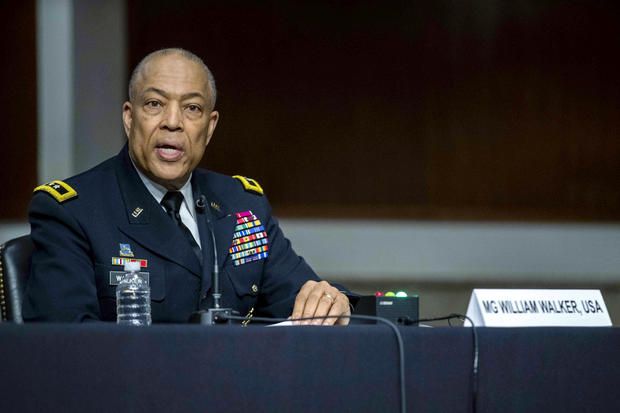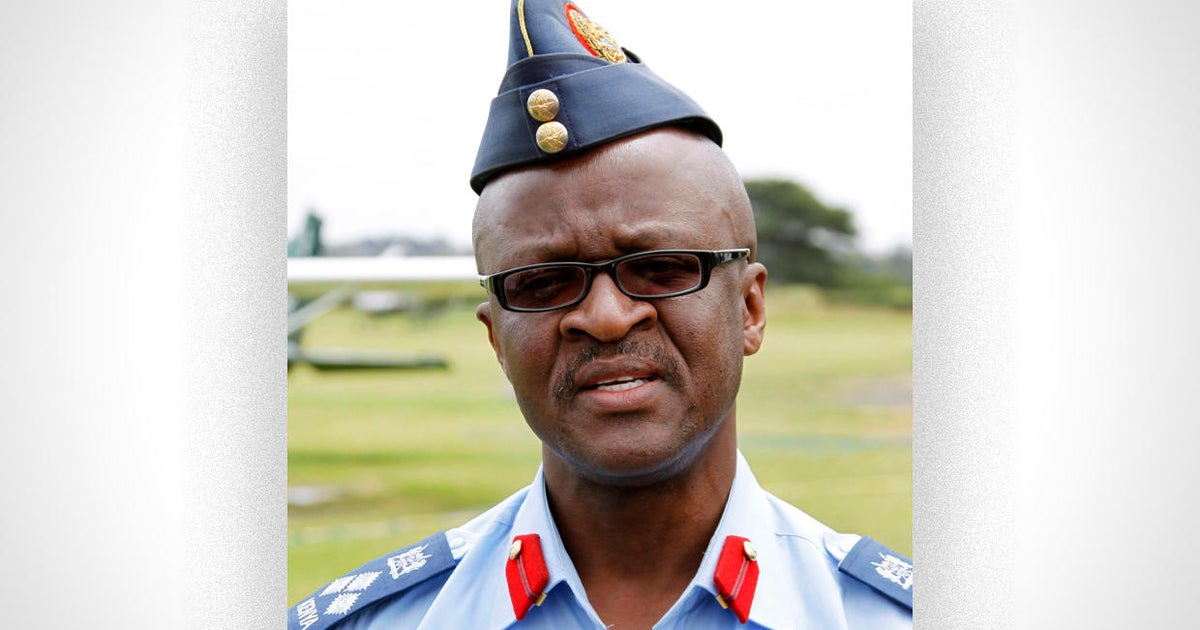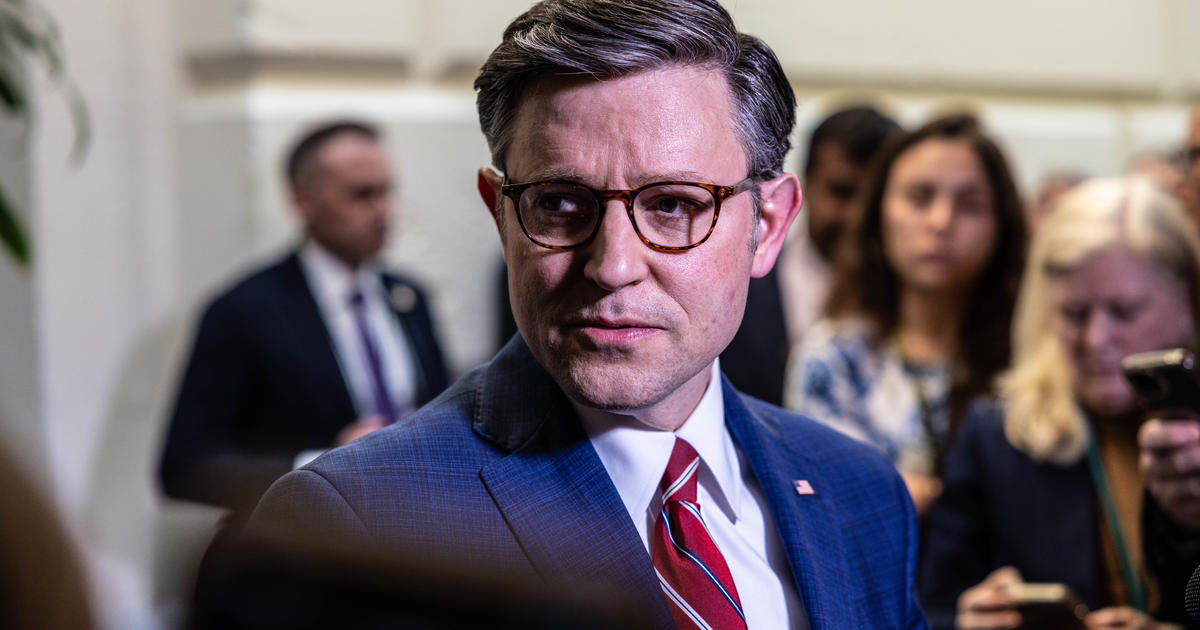D.C. National Guard chief says Pentagon took hours to send troops to Capitol
Washington — The head of the District of Columbia National Guard revealed Wednesday it took Pentagon leaders more than three hours to approve a request for Guard troops to assist Capitol Police officers overwhelmed by the violent mob that breached the U.S. Capitol on January 6.
Major General William Walker, the commanding general of the D.C. National Guard, laid out a timeline for senators that began with a "frantic" phone call from then-Capitol Police Chief Steven Sund pleading for help, and ended with guardsmen finally arriving at the Capitol to help reestablish the security perimeter.
"Chief Sund, his voice cracking with emotion, indicated that there was a dire emergency on Capitol Hill and requested the immediate assistance of as many available National Guardsmen that I could muster," he testified before a joint hearing of the Senate Rules and Homeland Security and Governmental Affairs Committees.
Walker said he received the call from Sund at 1:49 p.m. and immediately alerted Army leadership of the request.
"The approval for Chief Sund's request would eventually come from the acting secretary of defense and be relayed to me by Army senior leaders at 5:08 pm — 3 hours and 19 minutes later," he said. "We already had guardsmen on buses ready to move to the Capitol."
Walker said personnel arrived at the Capitol less than 20 minutes after the Pentagon green-lit the request for help.
Robert Salesses, a senior Defense Department official, said then-Acting Defense Secretary Chris Miller approved sending National Guard members to the Capitol at 4:32 p.m., though word of the decision did not reach Walker for another 36 minutes.
The Senate panels convened Wednesday for a second hearing to examine the security failures surrounding the January 6 assault on the Capitol, when the violent rioters attempted to stop Congress from counting states' electoral votes and reaffirming President Biden's victory.
The attack, which led to the deaths of five people, including a Capitol Police officer, has prompted oversight hearings from Congress, as lawmakers work to determine why law enforcement was unprepared for the violence at the Capitol and whether information about threats of violence was shared by the intelligence community with law enforcement partners.
Walker also indicated to senators that the Pentagon hindered his ability to quickly deploy guardsmen needed to provide immediate assistance to civilian authorities, as then-Army Secretary Ryan McCarthy "withheld authority for me to employ the Quick Reaction force" in a January 5 letter, he told senators.
He called the limitations "unusual."
Walker also revealed inconsistencies in his ability to swiftly deploy members of the National Guard to assist law enforcement during protests against police brutality in the summer of 2020 compared to January 6. He said he received immediate approval to send in troops to help with the response to demonstrations last summer, though that was not the case during the Capitol insurrection.
Pressed on whether the delay in the Pentagon's approval January 6 was related to politics and a desire not to interfere with the pro-Trump mob or in response to criticisms of the National Guard presence in June 2020, Walker said it was a combination of both.
In June 2020, during the week of civil unrest in the district, Walker said he was in constant communication with McCarthy. He did not have that benefit during the insurrection, Walker said.
"I don't think it was so much of what the District of Columbia National Guard and Guard nation did for June," he said. "I think it was more, the word that I kept hearing was the 'optics' of it. There was some concern that it could inflame the protesters."
In addition to providing senators with the timeline before National Guard troops arrived at the Capitol, Walker also detailed a phone call at 2:30 p.m. January 6 involving himself, Sund, Metropolitan Police Chief Robert Contee, District of Columbia leaders and Army leaders.
During the call, Walker said Contee and Sund "pleaded" for the D.C. National Guard to get to the Capitol "with all deliberate speed." But, he said, senior Army leaders "did not think it would look good" and were concerned the presence of uniformed guardsmen could incite the crowd.
Walker said he, like others on the call, were "stunned" by the response from Army leaders.
But Salesses, who spoke with former Pentagon officials involved in the decision-making January 6, said Lieutenant General Walter Piatt told him the word "optics" was never used and said Miller wanted to make decisions about how the National Guard was deployed, citing the events last summer.
Walker, however, said "there were people in the room with me on that call that heard what they heard."
The January 6 assault has prompted unprecedented security at the Capitol, with National Guard members from around the country remaining in Washington through mid-March in response to further threats of violence from far-right extremist groups and white supremacists.
Jill Sanborn, assistant director of the FBI's counterterrorism division, said in written testimony that the bureau "assesses there is an elevated threat of violence from domestic violence extremists," some of whom have been "emboldened" in the wake of the assault on the Capitol.
"Any time an adversary is successful, others pay attention, so we're worried this would be an inspiration," she told senators.
The U.S. Capitol Police is boosting security this week in response to intelligence showing "a possible plot to breach the Capitol by an identified militia group on" March 4. A conspiracy theory claims former President Donald Trump will retake power that date.
Melissa Smislova, acting under secretary of the Office of Intelligence and Analysis at the Department of Homeland Security, told senators the department and FBI issued an intelligence bulletin late Tuesday about extremists discussing March 4 and March 6.




